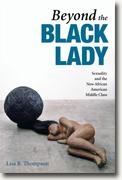Beyond the Black Lady
Lisa B. Thompson
book reviews:
· general fiction
· chick lit/romance
· sci-fi/fantasy
· graphic novels
· nonfiction
· audio books
· author interviews
· children's books @
curledupkids.com
· DVD reviews @
curledupdvd.com
newsletter
win books
buy online
links
home
for authors
& publishers
for reviewers

 |
Beyond the Black Lady: Sexuality and the New African American Middle Class (New Black Studies Series) Lisa B. Thompson University of Illinois Press Hardcover 200 pages July 2009 |
|
Common images of black women often include sensuality and downfall; to combat that perception, many black women have risen to prominence by projecting an image of “the black lady.” Typical of the black lady in modern America would be the personal perfection of Condoleeza Rice. Rice “fashions her persona by making her sheltered Southern middle-class childhood a central facet of the personal mythology. Her comportment recalls the image of the black version of the southern belle…” W.E.B. Dubois described this persona as “the intelligent wife, the Christian mother, the earnest, virtuous helpful woman…lever and fulcrum for uplifting the race.” Only through this “uplifting” character portrayal could African Americans erase the older notions of black women as wild, orgasmic creatures readily available as sex objects and, by extension, property.
One public figure featured prominently in Thompson’s work is Anita Hill, the respectable academic who had the gall to challenge the male dominance of her black boss, Supreme Court Justice Clarence Thomas. Alluding to Hill, playwright Judith Alexa Jackson staged WOMBman WARS, making the point that “a black woman’s body is a battlefield upon which gender issues are staged.” Having alleged sexual harassment, Hill’s struggle for vindication against the power-wielding Thomas played out in front of Americans on daytime TV, becoming the reality show of its day. It also took black women out of the realm of fiction and sitcom and into the forum of political, gender and racial judgment. Hill confirmed and underscored her status as an independent woman who refused to be baited by insinuations about her sexual preference. She emerges as multi-dimensional, a complete person not definable merely in terms of race or gender. That in itself is a victory. Coretta Scott King was a “black lady” who remained in apparent nun-like aloneness after the assassination of her legendary husband. Thompson states: “She is but another example of the middle-class black woman sacrificing her own integrity for the imagined needs of the African American community.” King sought to bolster the image of the Southern black woman as better than or as good as the white woman, a standard bearer of respectability in the face of tragedy. Black female filmmakers like Kasi Lemmons (Eve’s Bayou) and Julie Dash (Daughters of the Dust) use the Southern milieu as a setting to probe the inner life of the black woman, from the hoodoo conjure-woman to the “ruined” and fallen women of the middle-class. They employ “the Southern landscape as a metaphor for black female exoticism and excess and contrast it with the repressive black middle-class mores.” Both black and white respectability fall prey to the heat and dust of the sultry Southern climate. The many expressions of female sexuality depicted by contemporary black artists make rich terrain for this far-reaching exploration. The work of seeing black women beyond the stereotypes has begun, somewhat behind but not mimicking that of the white feminist creators, and Thompson seeks to chronicle it. As she succinctly puts it, “because the depiction challenges expectations, it is ground-breaking that writers render middle-class black women as sexual subjects” [emphasis mine]. Thompson underscores the distinction between the admirable but one-dimensional picture of the black lady, and the liberating image of the black woman as a person with humanity fully expressed in her sexual being. Originally published on Curled Up With A Good Book at www.curledup.com. © Barbara Bamberger Scott, 2009 |
|
|
|
 Click here to learn more about this month's sponsor! |
|
| fiction · sf/f · comic books · nonfiction · audio newsletter · free book contest · buy books online review index · links · · authors & publishers reviewers |
|
| site by ELBO Computing Resources, Inc. | |
 Author, playwright and assistant professor Lisa B. Thompson has assembled
an in-depth look at the explosion of the black lady ethos, examining the many ways in which black women in the arts and public life can regain a sense of their sexuality without losing the dignity of their personhood.
Author, playwright and assistant professor Lisa B. Thompson has assembled
an in-depth look at the explosion of the black lady ethos, examining the many ways in which black women in the arts and public life can regain a sense of their sexuality without losing the dignity of their personhood.